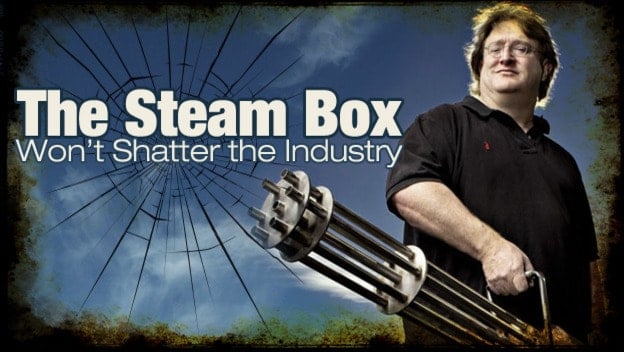Until recently, gamers and developers alike have been playing the what-if game when it came to the next generation of consoles. Thankfully, we’ve now got some solid facts to go on and the rambling and rumors have subsided at least for the PS4 , instead being replaced by confirmed launch windows and lineups. And although the PlayStation 4 and the next Xbox are on the tip of almost everyone’s tongue these days, a sizeable chunk of players are interested in a very different box o’ gaming—specifically, Valve’s alleged Steam Box.
The colorful fable of the Steam Box began in much the same way as most hardware wives’ tales: as a rumor. “This developer is going to break into the hardware market with an innovative piece of tech that’s poised to…”—at which point, the rumors get stopped up for a few months. Historically, we’ll then see a “leaked” specifications document, hear some commentary about the system from big-name developers, and maybe find a logo or two lying around. However, this particular rumor skipped several levels of the hardware hype chart—announcements, announcements of announcements, announcements of those announcements, PR scandals—and went straight to fanboy deification.
Given the popularity of Valve and the abruptness of the announcement, this is to be expected. However, as the industry’s current agenda will show, the hardware sector is all but impregnably privatized, so any new contenders will have a tough time finding limelight between the shadows cast by the three hardware titans. Moreover, the Steam Box creates a number of unique hurdles that could easily keep it from leaving the gray days of Alpha.
The basic idea of the Steam Box is quite simple: It’s a console with access to the Steam network, the most active and successful form of digital game distribution. Unfortunately, and largely due to the complete lack of clarification on the matter, this base idea has been ripped into a number of misconceptions that serve only to assert the PC side of things as the gaming “master race.”
The first and most notable of these fallacies is the notion that, due to the success and dominance of the Steam network, a potential Valve console comes with a target market basically pre-installed, because current Steam users simply translate into Steam Box users. This couldn’t be further from the truth. There’s a glaring boundary in front of such a conversion in the simple form of the word “console.” Steam is a PC network by design, and is therefore populated exclusively by PC gamers. No matter how flashy and enticing the console, that audience will undoubtedly remain true to that platform of hardware, which leaves the Steam Box with the daunting task of carving out a decent following in today’s market.
This leads us to the issue of relevancy. On paper, the Steam Box is absolutely brilliant; it gives console gamers access to countless titles heretofore off-limits without taking away the familiar simplicity of console systems. However, the saturated state of the console market and the impending holiday launch of the PS4 and NextBox devalue that impressive array of titles, which is arguably the most promising aspect of the Steam Box.
Think about it. The Wii U is already out and has several AAA games on the way, Sony has confirmed a holiday launch window for its next-gen system, and Microsoft is expected to follow suit. This eliminates a late 2013 launch window (which was highly unlikely anyway) since a new system wouldn’t be able to compete with ardent Microsoft and Sony consumers in such a fast-paced market. An early to mid-2014 release isn’t viable either, as that’s the time when the PS4 and NextBox will (hopefully) have found a foothold and begun campaigning beyond their initial launch titles. So, unless Valve wants to kick-start its own console generation several years down the road, that leaves late 2014 as the earliest option. Again, we have the problem of too-little-too-late, as next-gen buyers won’t be interested in shelling out three more digits on a system when they just bought one.
These scenarios share a similar problem: The enormous—and, for console gamers, unexplored—market of Steam titles isn’t nearly as impressive when there are more established and familiar companies (again, from the console gamer’s point of view) offering the same product left and right. Although the array of new titles would be a great opportunity for console gamers (I know I’d love to take some of my favorite PC games into the controller-and-box market), newly announced titles like Infamous: Second Son, Watch Dogs, Killzone: Shadowfall, Deep Down, and the like will simply overshadow it.

Regrettably, it boils down to a popularity contest, and the console market has already sided against Valve on this one.
There are also a number of crackpot theories about the Steam Box effectively hybridizing console and PC architecture. Rumors boasting the option to “upgrade your system” have already cropped up, all implying that owners would be able to increase their Steam Box’s performance by tacking on some additional RAM, a video card, or even expanding the board interface. These are all equally preposterous (though the last suggestion is particularly laughable), as the notion of upgrading the system makes the Steam Box nothing more than a handicapped gaming PC. Consequently, the idea would fall on deaf ears at best, and flat on its face at worst. This echoes the issue seen in the release date dilemma: Offering more of the same will not secure a new and untried system’s place in the hardware market.
With those “innovative features” knocked off the list of incentives, the deified Steam Box is nothing more than a one-trick pony of a system that offers nothing beyond what we already have plenty of. As a result, it seems to have no place in the industry at this time. With that said, we shouldn’t eliminate Valve from the list of competitors just yet. Valve is more than clever enough to have something up its sleeve.
 | By Austin Wood Contributing Writer Date: May 13, 2013 |
